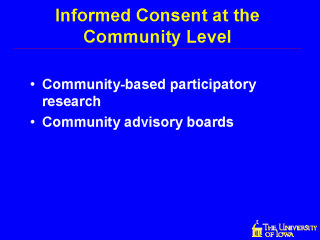 |
These are a couple
of strategies to directly engage communities in the development and
implementation of public health interventions that might be applied where
they live. Community-based participatory research is an approach that
involves community members in all aspects of a public health research
project including: assessing needs, formulating questions, devising
intervention strategies, evaluating outcomes, and implementing programs and
policies. Community advisory boards have been proposed as a valuable means
of obtaining community input on clinical trials, especially the informed
consent process, to ensure that participants are fully aware of risks,
benefits, and implications. The advisory board process could also be used to
engage community members in other types of public health interventions. |
